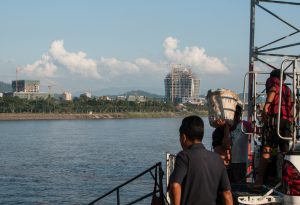Around six months ago, Ekapop Lueangprasert, a local government official and business owner in the Sai Mai suburb of Bangkok, was checking messages sent to his Sai Mai Must Survive Facebook page – a volunteer initiative he’d set up to try and help local people struggling financially during the pandemic – when he received a disturbing video from an 18-year-old girl.
“Today is January 28th at 1 am, 2022. I’m in a building opposite the Karaoke Bar,” says the Thai teenager into the camera, her eyes swollen from crying. She seems exhausted, close to breaking point, but determined to get as much information across as she can while she has the chance. The woman explains that she traveled from Bangkok to Sa Kaeo on the Thailand-Cambodia border to meet a Thai broker who had promised her a job in Poipet, a seedy casino town just over the border in Cambodia. She was then told that the role would actually involve scamming strangers online – and that if she wanted to leave, her father would have to pay 40,000 baht ($1,080) to secure her release. “I know everything and I’m afraid that [the boss] will kill me,” she sobs. “I don’t know what he will do to the others after this and I don’t know if I can contact you again. I’ve heard that at least 20 or 30 people have died.”
The request had come out of the blue and Ekapop was initially apprehensive. “I asked her, how can you use your phone?” he says. But as the teenager hastily sent and deleted location pins, photos from the compound, and other evidence of her treatment, it became clear she was telling the truth – and in the coming months, messages, videos, and photos flooded in from other Thai trafficking victims trapped in borderland casino towns in Cambodia, Laos, and Myanmar. All told near-identical stories about being duped by offers of well-paid, legitimate work, only to find themselves imprisoned in horrifying conditions by Chinese gangsters. Under constant threat of violence, they were forced to engage in illegal activities – mostly tricking people into making fake investments online – with the knowledge or even collusion of local authorities.
“The serious rights abuses happening in these border casino cities and so-called ‘special economic zones’ require urgent action by governments,” says Phil Robertson, Asia director for the advocacy group Human Rights Watch. “The litany of rights violations are shocking, including false recruitment, stripping people of their passports and other identity documents, abductions and trafficking, confinement, debt bondage, forced labor, physical beatings, and sexual abuse. The scope of these operations, and the impunity they enjoy to commit rights abuses, are a shocking and unacceptable indictment of the lawlessness prevalent under dictatorial rule in Cambodia, Laos, Myanmar and elsewhere.”
Industrial-scale online scam operations proliferated during the COVID-19 pandemic, taking over massive, heavily guarded complexes in hotspots like Cambodia’s Sihanoukville and Poipet, and the Golden Triangle Special Economic Zone in Bokeo, northwest Laos. These tend to be based in casino hubs, which saw a sharp decline in revenue as travel restrictions brought in-person gambling, especially from Chinese tourists, to a halt. Alarmingly, many are also located in or alongside special economic zones (SEZs): areas marketed as relaxed-regulation industrial parks with one-stop tax offices to stimulate overseas investment, but which often descend into lawless enclaves patrolled by private security firms, which local authorities are unwilling or unable to police or control.
Survivors and rescuers interviewed in Laos and Thailand described workers trafficked into these compounds as being beaten, electrocuted, starved of food and water, and sold to other companies if they resist or fail to make their targets. Suicides are commonplace, as are videos circulating of handcuffed recruits being tasered in their dorms. Enslaved workers are bought and sold between companies, including through a human trafficking Telegram channel called White Shark.
“In some of the places along the borders, countries aren’t exercising any authority, and in others they barely do,” says Jeremy Douglas, Southeast Asia head of the United Nations Office for Drugs and Crime (UNODC). “The rule of law is limited or absent in these locations, criminals have poured in, and people are being victimized as a result.”
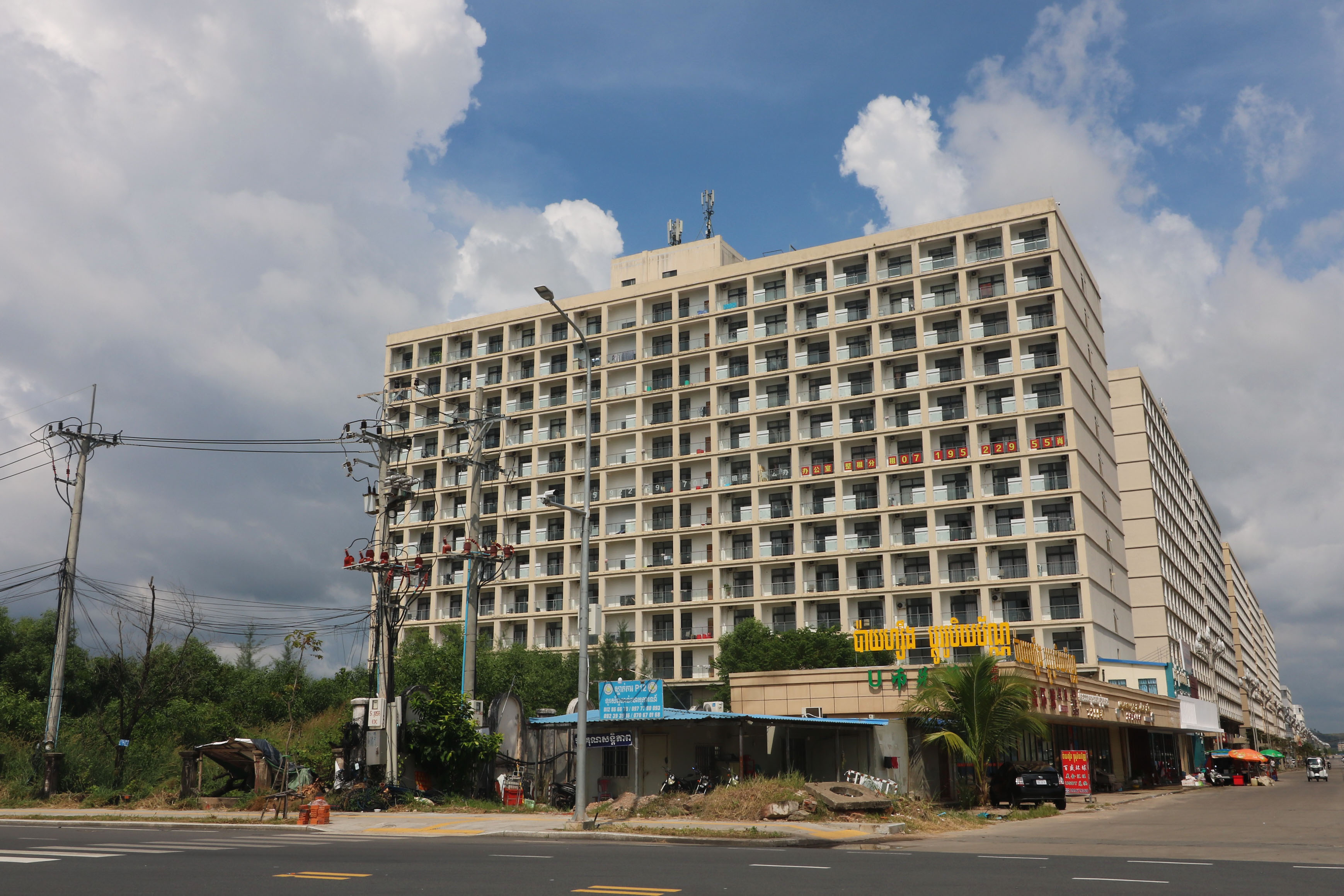
A building that is believed to house a scam call center in central Sihanoukville, Cambodia. A police checkpoint is on the corner. (Lindsey Kennedy)
In Cambodia, the slaves-for-scams crisis has become so bad that it contributed to the U.S. government’s decision to downgrade Cambodia to Tier 3 – the lowest possible rating – in its 2022 Trafficking in Persons Report, released on July 21. “The report highlights online scam operations and associated trafficking crimes, along with the endemic corruption and lack of political will that limits progress in holding traffickers accountable,” said Chad Roedemeier, spokesperson for the U.S. Embassy in Cambodia. “We stand with the Cambodian people to identify, support, and seek justice for victims.”
Meanwhile, in Myanmar, whole new city-SEZs centered around Chinese-owned casino developments have been carved out in Myawaddy and nearby Shwe Kokko in Kayin State over the past two years. These are already being linked to human trafficking, online scams, and sexual exploitation. In April, Ekapop helped a woman being held against her will to plan her escape from a Myawaddy casino guarded by soldiers, and swim across the Moei River to safety in Thailand. The woman claimed that around 300 other women were still trapped inside, and had been forced into prostitution after responding to a job advertised by an Instagram influencer. Twenty-five kilometers away in Shwe Kokko, swathes of recruits believing they had jobs waiting at the casino are reportedly trapped in debt bondage, forced either to work for online scams or sold into the sex industry until they can pay their way out.
According to Ekapop, female trafficking victims across the whole region tell him that the threat of being sold into sex work looms large, no matter what job they were initially promised. “The compliant women are made to work for the scams inside the casino, and the noncompliant ones are forced into sex work,” he says. In order to give themselves a fighting chance, Ekapop advises those who reach out to him to keep quiet and comply as much as possible for the first month or so – not only to avoid being sold to an even worse fate, but also because guards and managers become complacent about monitoring their every move, and may even reward them by letting them venture outside alone, opening up a brief window to arrange a rescue.
By July, Ekapop had helped to free nearly 140 people from modern slavery nightmares, mostly from Poipet and Sihanoukville in Cambodia, Vientiane and Bokeo in Laos, and Myawaddy and Mong La in Myanmar. His vigilante, cross-border rescue missions have made him something of a national hero in Thailand. He operates, he says, with the “definite approval” of the Thai authorities, who are unable to intervene outside their jurisdiction without the explicit permission and cooperation of the host country.
While the online scam industry has exploded since the start of the pandemic, many of Southeast Asia’s casino towns – especially those situated in isolated, self-governing SEZs – were already implicated in serious human trafficking and child sexual exploitation before COVID-19 hit.
In 2019, Apple (her nickname; she asked to remain anonymous) saw a job advertised on Facebook for “PR girls” in a nightclub in Mong La, an insalubrious, borderland casino town in a rebel-administered territory in Myanmar’s Shan State. Mong La is essentially a Chinese enclave. It’s controlled by a former Red Guard commander, uses Chinese yuan as currency, and runs on Beijing time. Apple is by no means naive: while her braces and matching shade of bubblegum-pink lipstick, eyeshadow, and bucket hat make her seem much younger, she is actually in her mid-30s, and had previously worked in karaoke bars and as a casino dealer in Singapore, Korea, Japan, Taiwan, and Malaysia. Plus, the agent was upfront about prostitution at the venue, giving her the option to apply for a job selling sex or a more senior, front-of-house role making use of her Chinese language skills, where she would be paid 75,000 baht ($2,050) per month to welcome customers and encourage them to drink. Apple chose the latter, flew from Bangkok to Chiang Mai in northern Thailand, and met the agent who would take her overland to Mong La.
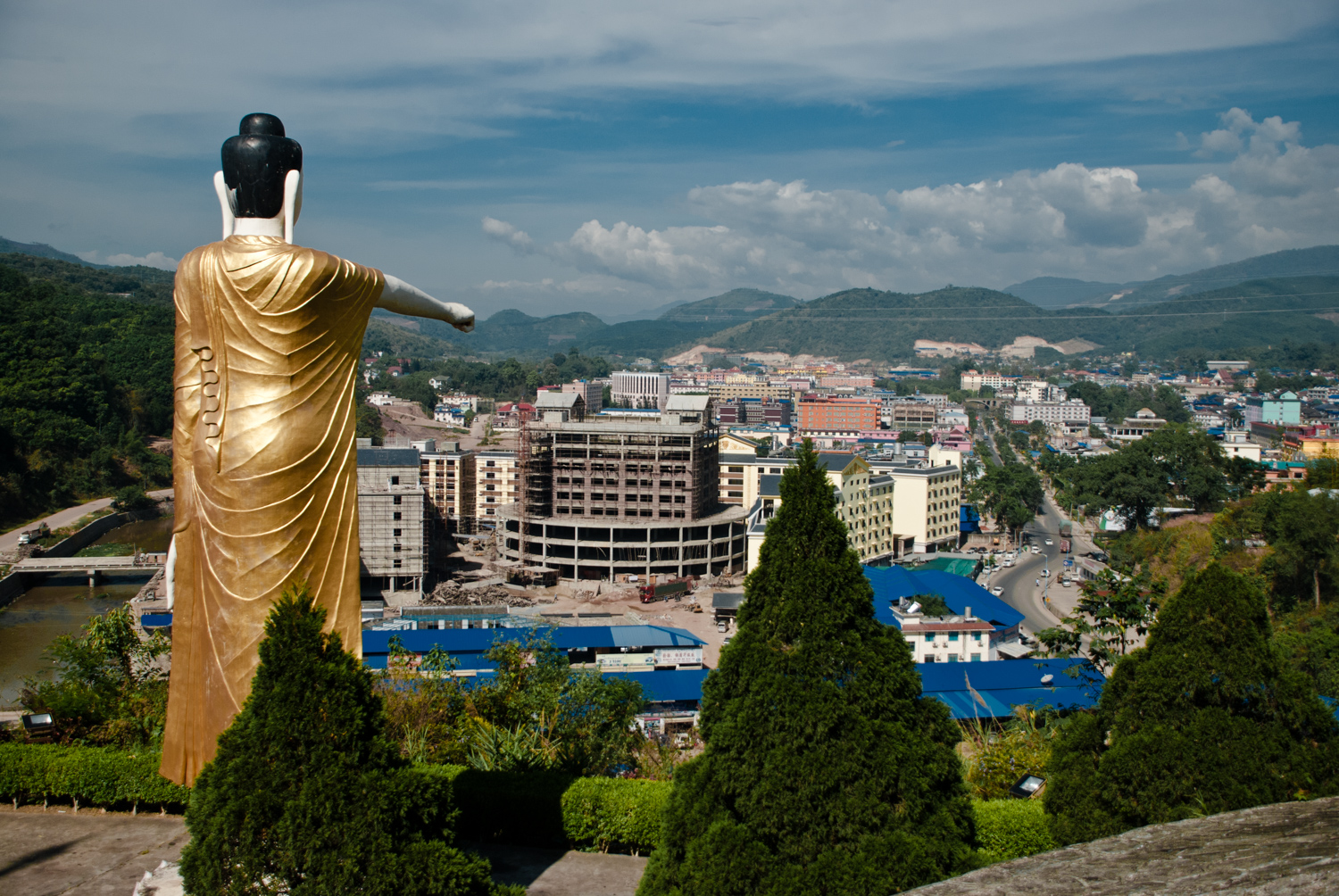
A view of Mong La, a gambling enclave on the border between China and a rebel-administered sliver of Myanmar’s Shan State. (Sebastian Strangio)
It quickly became clear that this was not a normal employer. “The agency are gangsters and have people working every step of the way – every checkpoint, they pay a bribe,” she explained via an interpreter. “They gave me a fake Burmese identity card and I had to pretend I couldn’t speak.” Once in Mong La, her excitement at the big city lights evaporated when she discovered the agent had fled with her first month’s paycheck and she was not allowed to leave the club, which doubled as her accommodation unless accompanied by an armed guard. “They were afraid we would run away,” she says. The PR girls were mostly Thai, says Apple, but almost all the sex workers were local girls from the Tai Yai ethnic minority, most of them children as young as 13 who had been sold by their parents and were forced to sleep with the Chinese, Burmese, and ethnic Wa men who visited the club looking specifically for little girls, some of whom were so “mentally damaged” by the ordeal that they would cut themselves. To keep them skinny for the weekly bikini show, the women and girls were only allowed to eat twice a day, but a cabinet of methamphetamines, cocaine and ketamine was provided free of charge. “The drugs stopped us getting hungry,” she says.
Two months after she arrived, Apple concocted a plan to escape, getting her boss high and videoing him giving her permission to leave, then paying a people smuggler to get her across the border. She arrived home with just $400 of the $4,000 she’d been promised, but at least she hadn’t been forced to have sex with clients. At 34, she was deemed too old, she explains.
When it comes to ownership of these casinos and SEZs, the same names crop up again and again. Back in 2005, amid reports that Chinese officials were gambling with money stolen from the state, China sent troops to shut down casinos in Mong La. The town bounced back, arguably seedier than ever, and pivoted to online gambling. But two of the Chinese casino owners – Zhao Wei, who began his gambling empire in Macau, and Huang Mingxuan (or Wong Man Suen), a Hong Kong resident originally from Fujian province – soon decamped to Laos. Zhao has since invested more than a billion dollars in the Golden Triangle Special Economic Zone (GTSEZ), the self-governing casino and tourism enclave on the Mekong River that has become a center of sexual exploitation and human trafficking into online scams. Locals call it Kings Romans, the name of Zhao’s company.
“Laos can’t do anything there,” says Ozone, a local government official in Mae Sai, a town on Thailand’s northern border with Myanmar, close to the Golden Triangle area that also borders Laos and Kings Romans. “If Lao police go inside they need to leave their guns,” he adds. “Even if they kill someone, the Lao government has to ask permission to come into Kings Romans. They have their own law.”
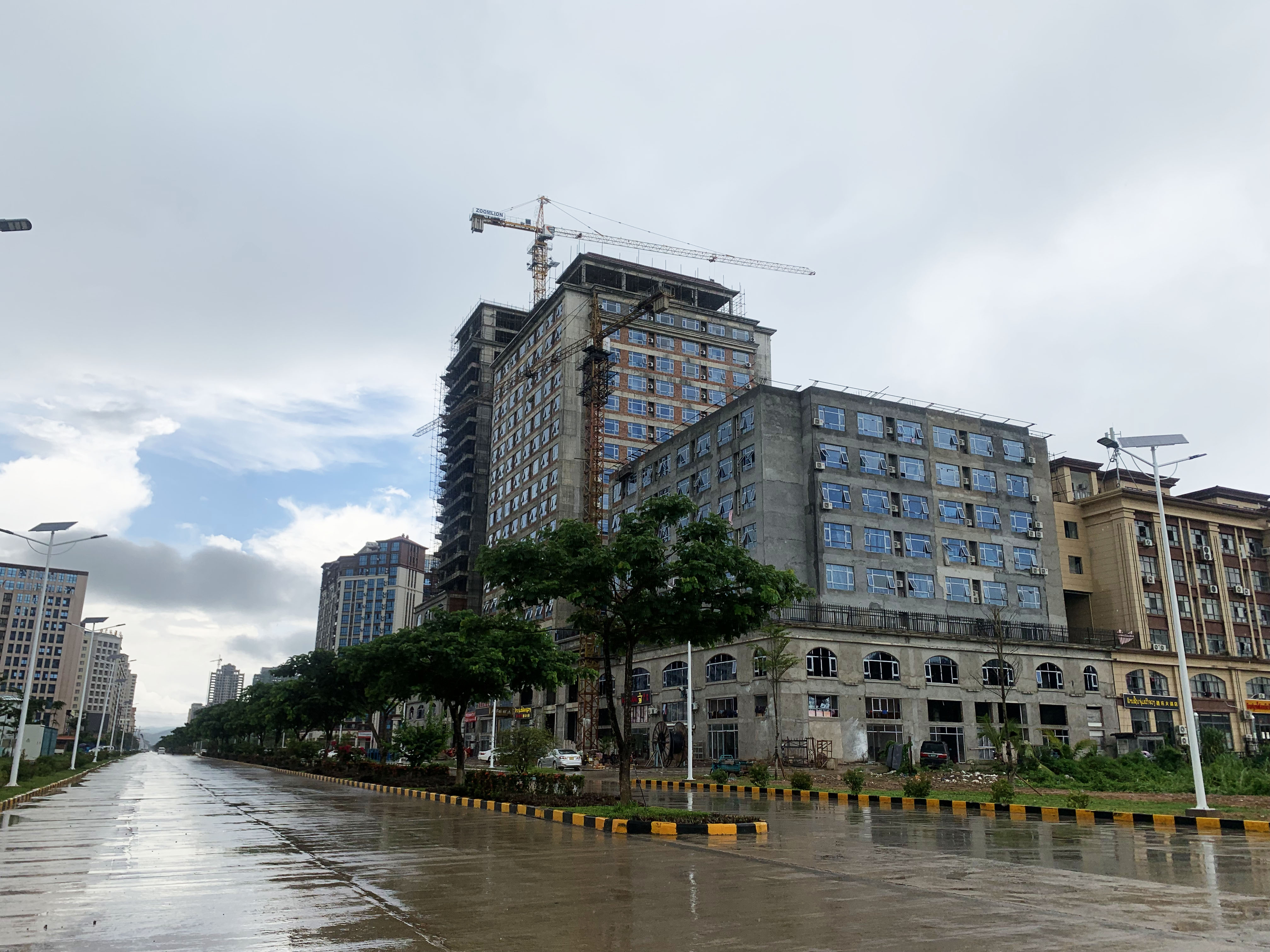
New high-rises under construction inside the Golden Triangle Special Economic Zone, Bokeo, northwest Laos. (Lindsey Kennedy)
Ozone, who asked The Diplomat to use his nickname to avoid becoming a target for human traffickers or the “big mafia” that runs Kings Romans, helps run a social media hotline for local victims of human trafficking trapped in Myanmar and Laos. Speaking to The Diplomat in July, he said nine people from his community had reached out over the previous few months to ask for help escaping online scam operations.
Ozone says he investigates the credibility of each case, and if it seems real, calls a meeting with other government figures and members of Thai police, soldiers, and the navy (which has Mekong River units) to figure out how to assist the victim. If they are trapped in Myanmar, he may also need to coordinate with Myanmar border guards. But if the victim is inside the GTSEZ, there are only two options: “pay money or ask Kings Romans if they will allow them to leave.” In these cases, Ozone explains, the mayor of the nearby town of Chiang Saen isn’t powerful enough to speak to Zhao Wei directly; he can only negotiate with the Lao authorities and ask them to contact Kings Romans on his behalf, explaining that this is a big case and could look embarrassing for the SEZ, and hope that Zhao contacts the agent or company responsible to tell them to release the victim. But while Zhao might not be the person managing the trafficking into the zone, says Ozone, “he’s not really interested in shutting it down.”
At the same time as Zhao was setting up Kings Romans, Huang Mingxuan spearheaded the creation of Golden Boten City, a casino SEZ in Luang Namtha province, just inside the Chinese border. Boten rapidly descended into chaotic criminality, and in 2011, as murders, kidnappings and scams increased against Chinese citizens, China stepped in and forced the casinos to close. But Boten, which occupies an important strategic location in China’s Belt and Road Initiative (BRI), has now been given a second chance: it’s the stop where the brand new China-Laos high-speed rail crosses the border, and is getting a makeover as “Boten Beautiful Land Specific Economic Zone” – with Huang’s company, Hong Kong Fuk Hing Travel Entertainment Group, still on board as a partner.
The SEZ languished as a ghost town for over a decade, but the border crossing is a known route for transnational human trafficking. While no cyberslavery cases had been reported as of publication, when The Diplomat visited the remote SEZ in May, reporters found it heavily guarded, surrounded by high fences, barbed wire and security cameras, with a COVID-19 testing center at the only entrance. Inside, rows and rows of high-rise dormitory-style buildings were under construction, clothing hanging from most of the windows. They resembled the new scam sites that have recently been built in Sihanoukville and Kings Romans.
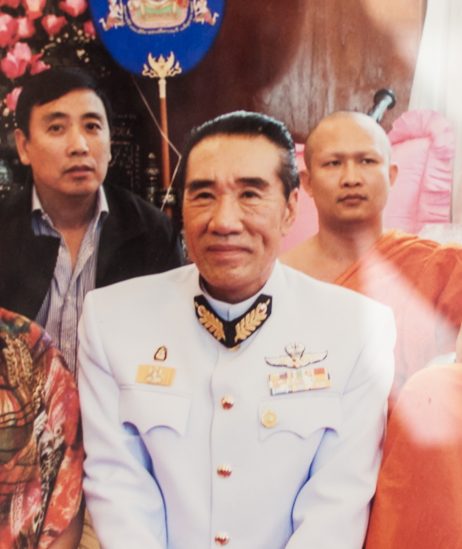
Zhao Wei, the chairman of Kings Romans Group. (Sebastian Strangio)
Another prominent architect of Southeast Asia’s casinofication is Wan Kuok-Koi, also known as Yin Guoju or Broken Tooth, a former 14k triad boss who oversaw a period of intense violence and power struggles over the casino trade in Macau, and was jailed for loan sharking, money laundering, and triad membership in 1998. By the time he was released in 2012, control of Macau had transferred from Portugal back to China, and Broken Tooth began enthusiastically promoting himself and his rebounding business empire as deeply patriotic. This centered around the creation of the “World Hongmen Association” in Macau in 2013, followed by a string of branches abroad, with the stated purpose “to love the country and the nation, organize cultural exchange activities in various places, and inherit the history and culture of the 1911 Revolution.”
In some marketing materials, Wan has gone even further, claiming not only that his Hongmen Association is “devoted to the cause of rejuvenating China” and “national reunification” (i.e. countering pro-independence sentiments in Hong Kong and Taiwan) but that commercial ventures such as the HB cryptocurrency he attempted to launch in Cambodia are an extension of this mission, by “uniting overseas Chinese” and championing China’s prosperity in the digital sphere. The U.S. government eventually accused Wan of using his Hongmen Associations in Cambodia and Palau to legitimize gangster activities and subjected them to Magnitsky sanctions in 2020. But by this point, Wan had already managed to get himself photographed alongside senior leaders in both countries, boasting that he’d secured gambling licenses and other government support, and had new a new casino development underway in Myawaddy, Myanmar – all the time projecting the idea that his business interests were part of the BRI.
“A lot of these individuals set up patriotic associations overseas and try to demonstrate, in a very public manner, allegiance to Communist Party initiatives – and they fund those initiatives,” says Jason Tower, country director for Myanmar at the United States Institute for Peace. “So they do work for China. They extend the reach of the international front on Taiwan issues. They go after Westerners who criticize China on Xinjiang or Tibet. And they’re making it difficult and costly for the state to crack down because it would mean making some of the Chinese state initiatives look bad.”
As of 2019, the Asia-Pacific online gambling industry was worth an estimated $15 billion, with some predicting a further 18 percent growth by 2026. This is driven in part by the widespread adoption of smartphones and the rapid growth of digital payments across Southeast Asia. As of 2022, 37 percent of Southeast Asians are internet users, 88 percent of whom own smartphones. Even though three in five people are still unbanked, mobile wallets, including some that aren’t linked to bank accounts, are taking off all across the region. In Cambodia and Thailand, scan-to-pay QR codes are ubiquitous, not only in city cafes and convenience stores but also at some small-town market stalls and roadside food stops, and in larger urban areas, you can use superapps to order anything from food and groceries to electronics and flowers for delivery within an hour.
Given this increasingly digital native environment, it’s not difficult for companies developing new types of online platforms that revolve around digital payments – whether gaming and gambling sites, investment schemes, or cryptocurrency – to find suitable customers or young people with the skills to work for them. But the rapid rate of change also creates opportunities for scams. In Thailand, surveys by the National Economic and Social Development Council found that nearly half the country’s population have been victims of some form of online scam, predominantly financial fraud, and around 1 billion baht was lost to call center gangs in 2021 alone.
Southeast Asia’s internet scam entities appear to have evolved from the online gambling industry, whose operators have played a cat-and-mouse game with Chinese officials across the region for years. These tend to follow the same pattern. First, investment pours in for a new (legal) casino development, then online gambling operators primarily targeting customers on the Chinese mainland set up shop around the hub, and quickly become much more profitable than the casinos themselves. These engage in increasingly shady practices to scam players out of their money, and ultimately attract the ire of Beijing, which doesn’t want the industry creeping into China itself, where gambling is illegal. China then pressures that country’s government to stop handing out new licenses or to ban online gambling altogether, the government accommodates, and the bulk of the online gambling industry either goes underground or packs up and moves to the next, more obliging location.
In 2016, a crackdown on illegal online casinos in the Philippines sent a tsunami of these operators to Sihanoukville, a coastal town that had begun issuing more casino licenses in a bid to revitalize the area, and allowed online gambling companies to operate out of physical ones. Then, in 2019, China again raised the alarm about criminal activity and the abuse of Chinese workers at online gambling companies. By this point, the Philippines was home to 50 registered casinos, while Cambodia’s total had shot up to more than 150. But in both countries, revenues from in-person gambling paled in comparison to off-site betting via videolink or on dedicated online gambling platforms.
In late 2019, President Duterte announced that he would stop issuing new licenses to online gambling companies in the Philippines, although he stopped short of banning the lucrative industry altogether. In Cambodia, Prime Minister Hun Sen also agreed not to renew the licenses of any online gaming companies, effectively rendering them illegal from the start of 2020, and introduced new legislation to regulate the industry, triggering an exodus of around 80 percent of Chinese nationals living in Sihanoukville. Coinciding with the onset of the COVID-19 pandemic, this dealt a serious economic blow to the gambling sector in Cambodia; around half of Sihanoukville’s bricks-and-mortar casinos also closed and the domestic gambling industry lost 90 percent of its revenue.
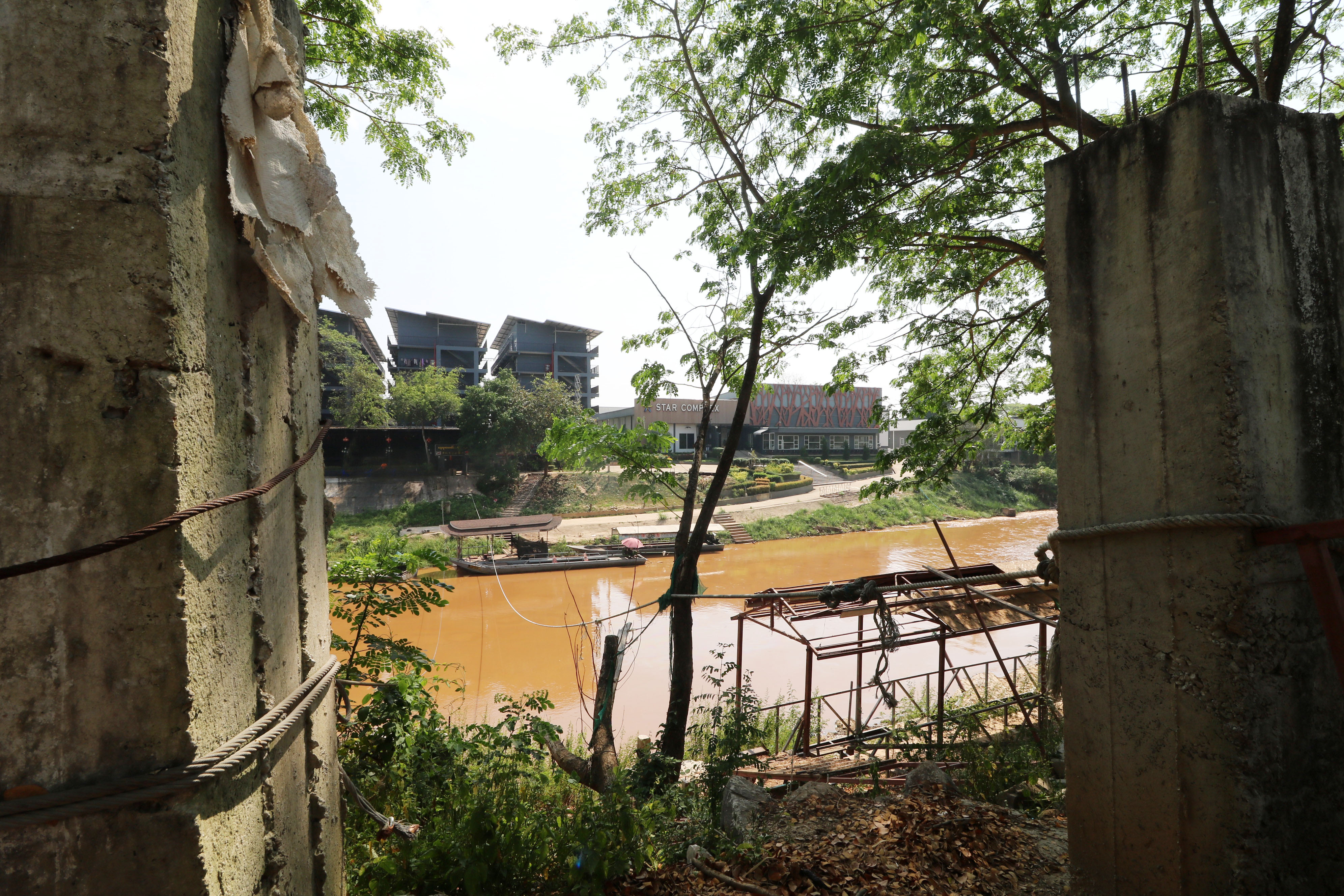
The Star Casino in Myawaddy, Myanmar, as seen from across the Moei River in Mae Sot, Thailand. (Lindsey Kennedy)
But Sihanoukville’s casino and online gambling moguls had already begun to diversify. In April 2019, reports emerged that Wan Kok-Kwoi had signed a 99-year lease with the government of the tiny Pacific island of Palau to open a special economic zone centered around a casino hotel. After a public outcry, the president denied issuing any such license, but Wan was still able to set up a Hongmen Association and in August the following year, nearly 60 Chinese nationals were arrested for running illegal online gambling operations in Palau. That same month, Wan – along with his business associates Datuk Tan Choon Hwa and Lee Han Keat, who joined the board of directors – was appointed chairman of Inix Technologies, a struggling Malaysian IT company and e-commerce portal run by a Chinese mother and son team Zhang Li and Zhang Wang. Within a few months, Wan had been placed on the country’s wanted list for alleged financial crimes including perpetuating a $1.3 million fraud via Inix.
Wan’s vice president at the World Hongmen Association is the Malaysian Nicky Liow Soon Hee, who is himself a protegé of the infamous Chinese fraudster Zhang Jian, a quasi-cult leader who perpetuated one of the largest ponzi schemes in the country’s history: a crypto scam called Wuxing Coin. Nicky’s business interests include a string of e-commerce apps and cryptocurrency trading platforms under the name “Yunbao,” but he was eventually arrested in April 2021, along with two of his brothers, for links to a Macau criminal syndicate and running a call center-based investment scam operation, which allegedly funneled stolen money through online gambling and crypto trading scams.
Despite all this – or perhaps in an effort to take back control of the crime-ridden industry – in November 2021, Malaysia’s Deputy Minister of Communications and Multimedia Zahidi Zainul Abidin proposed redrafting the country’s gambling laws to make it easier to regulate and tax online gambling. In June of this year, the government of Laos also revealed plans to allow a Philippines-style online gaming model, which would not require these operations to link themselves to physical casinos. This comes at a time when Ekapop and other rescue workers say they are getting more and more calls for help from trafficked workers in online scam centers inside casinos on Lao territory.
Meanwhile, Beijing appears to have a hard time figuring out what to do about Chinese citizens brazenly perpetuating or facilitating massive criminal operations overseas, while at the same time claiming – sometimes with some basis in truth – to be furthering the interests of their homeland.
Take Zhao Wei. As Jason Tower points out, China has made significant efforts to call back nationals suspected of running online scam syndicates in Southeast Asia, including a significant number found to be leasing office space from Wei in the GTSEZ. But despite this, the GTSEZ “continues to receive accolades from the Chinese government for its contributions to the BRI, and for the steps it has taken to address crime, especially drug trafficking,” says Tower. What’s more, he says, Chinese state media has repeatedly profiled the zone’s founders in glowing terms, “completely ignoring the rampant criminality and long history of involvement in illicit casinos in the China-Myanmar borderlands.”
Beijing may have new reasons to turn a blind eye to shady developments by overseas Chinese nationals. The BRI is proving extremely expensive, not least because COVID-19 has piled economic pressures onto its partner governments, pushing already fragile economies overburdened with debt into defaulting on their repayments. China had to renegotiate or extend $52 billion worth of loans in 2020 and 2021 alone, and the OECD rates most BRI countries at the highest level of financial risk. This, coupled with the logistical challenges of investing in and developing projects along the BRI at a time when most Chinese citizens – including business leaders, workers, and tourists – are finding it near-impossible to travel freely in and out of their home country, threatens to severely limit the revenue-raising capacity of these mammoth infrastructure and commercial developments.
It seems that organized crime groups in Cambodia, Laos, and Myanmar may be filling in some of those gaps – and tens of thousands of trafficked, enslaved, abused workers, along with the people they are forced to scam, are paying the price.













